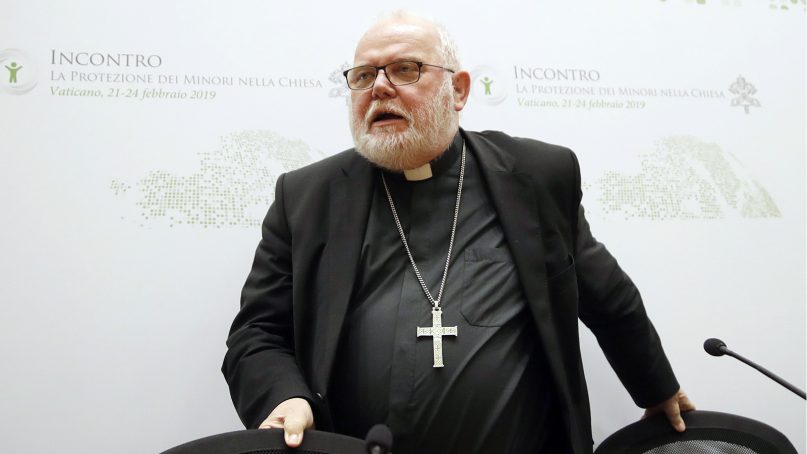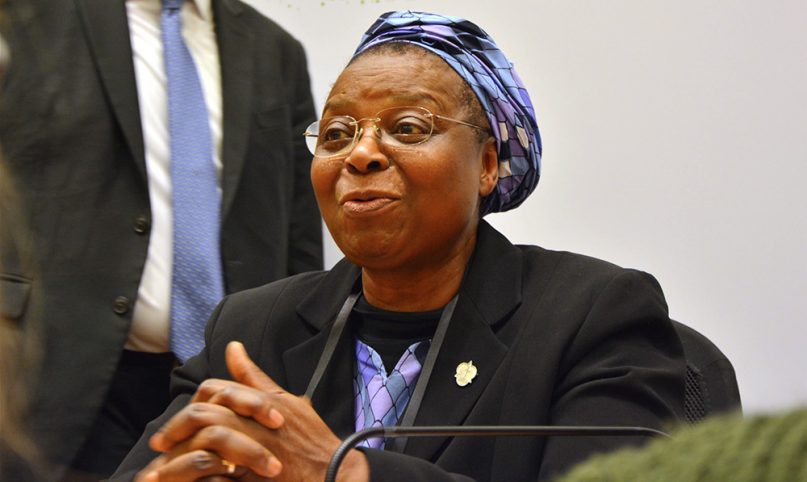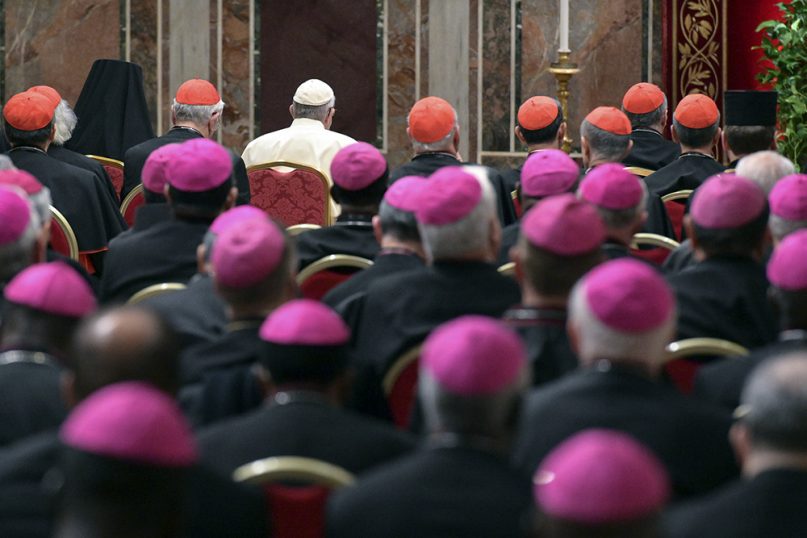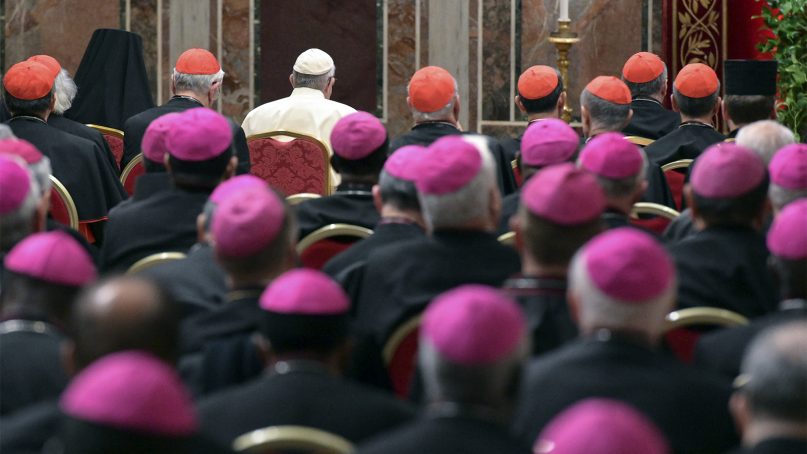
Cardinal Reinhard Marx leaves at the end of a media briefing during a four-day sex abuse summit called by Pope Francis, in Rome, on Feb. 23, 2019. (AP Photo/Alessandra Tarantino)
VATICAN CITY (RNS) — On the last full day of the meeting in Rome on clergy sex abuse, a German cardinal and a Nigerian nun, each in his or her own way, explained that transparency was the only way for the Catholic Church to deal with the crisis. They spoke with bluntness unusual in meetings of bishops, practicing the transparency they preached.
In his presentation, Cardinal Reinhard Marx, the archbishop of Munich, acknowledged that files were destroyed, silence was imposed on victims, and procedures for the prosecution of offenses were deliberately not complied with.
“The rights of victims were effectively trampled underfoot, and left to the whims of individuals,” complained the cardinal.
What is needed is transparency, he said, where “actions, decisions, processes, procedures, etc., are understandable and traceable.” He noted that similar transparency is also important in finances, another area where scandals have taken place.
While acknowledging the German love of administrative rules and procedures, he said that in the church, “administration should take place in such a way that people feel accepted in administrative procedures, that they feel appreciated, that they can trust the system, that they feel secure and fairly treated, that they are listened to and their legitimate criticism is accepted.”
Transparency is especially important so people “can uncover errors and mistakes in the administrative actions and defend themselves against such actions.”
He argued that “the principles of the presumption of innocence and the protection of personal rights, and the need for transparency, are not mutually exclusive.”
Marx even criticized the practice of secrecy in the Vatican, which imposes church penalties for revealing things the Vatican doesn’t want disclosed. He saw no reason “why pontifical secrecy should apply to the prosecution of criminal offenses concerning the abuse of minors.”
The cardinal also called for the publication of judicial proceedings and the release of statistics on the number of abuse cases.
Marx’s focus on administrative structures contrasts with Pope Francis’ stress on conversion and commitment: Francis focuses on changing the culture of the church, while Marx focused on making sure things are done properly.
These approaches are not in conflict; they are complementary. All the structures in the world will not work unless people are motivated to do the right thing. Likewise, all the good intentions in the world will not suffice if you don’t know what to do.
The speaker before Marx did focus on the church’s culture, but made a similar plea, calling for the bishops to break the culture of silence and secrecy that sought to protect abusers and avoid scandal.

Sister Veronica Openibo, a Nigerian nun and leader of the Society of the Holy Child Jesus, speaks to reporters at the Vatican. RNS photo by Jack Jenkins
“Too often we want to keep silent until the storm has passed. This storm will not pass by,” asserted Sister Veronica Openibo of the Society the Holy Child Jesus. “Is it possible for us to move from fear of scandal to truth?”
She called not only for publishing the names of offenders but also “a complete set of information regarding these situations.”
Openibo, who studied in the United States for three years, described watching “Spotlight,” the 2015 film about the Boston Globe reporters who exposed clergy abuse in their city. Tears of sorrow flowed at the end of the film, she said, when a long list of cases and the dioceses was displayed, showing the number of children affected.
“How could the clerical church have kept silent, covering these atrocities?” she asked the assembly. “Our mediocrity, hypocrisy and complacency have brought us to this disgraceful and scandalous place we find ourselves as a church.”
She urged those present to maintain zero tolerance of sexual abuse, without exceptions for the elderly or those in high office.
Other issues regarding sexuality that have not been addressed sufficiently, she said, include the “misuse of power, money, clericalism, gender discrimination, the role of women and the laity in general.”
She disagreed with those Africans and Asians who say that “this is not our issue in countries in Africa and Asia, it is the problem in Europe, the Americas, Canada and Australia.”
Working for nine years on sex education in Nigeria, she heard many stories of abuse, some of which she shared. She spoke of abuses in convents and formation houses, as well as of a 13-year-old girl attacked by a priest.
“The fact that there are huge issues of poverty, illness, war and violence in some countries in the Global South,” she said, “does not mean that the area of sexual abuse should be downplayed or ignored.”
Like Francis, she sees clericalism at the heart of the abuse crisis. “The normal process for clergy — in the past and still in the present in some areas,” she complained, “was/is to give support to ‘one of us,’ to avoid exposing a scandal and bringing discredit to the church.”
She said that she worries when she sees, in Rome and elsewhere, “the youngest seminarians being treated as though they are more special than everyone else, thus encouraging them to assume, from the beginning of their training, exalted ideas about their status.”
She also challenged the role of minor seminaries, saying that the study of human development raised serious questions about the existence of high school boarding schools for seminarians.
She addressed the pope as “Brother Francis” and thanked him “for taking time as a true Jesuit to discern and be humble enough to change your mind, to apologize and take action.” He should be an example for all of us, she said.
The concluding speaker on Saturday was Valentina Alazraki, a journalist covering the Vatican, who insisted that “transparent communication is indispensable to fight the sexual abuse of minors by men of the church.” In her presentation, she said that journalists should be seen not as enemies but allies whose “mission is to assert and defend a right, which is a right to information based on truth in order to obtain justice.”
On the other hand, “If you do not decide in a radical way to be on the side of the children, mothers, families, civil society,” she said, “you are right to be afraid of us, because we journalists, who seek the common good, will be your worst enemies.”
She noted recent stories in the Vatican’s semiofficial newspaper, L’Osservatore Romano, about the abuse of nuns by priests and bishops. She urged the bishops to play offense, not defense, in handling these abuses, “which are not only sexual but also abuses of power.”
In conclusion, she hoped that bishops and journalists could “join our forces against the real wolves.”

Pope Francis, background third from left, attends a penitential liturgy at the Vatican on Feb. 23, 2019. The pontiff hosted a four-day summit on preventing clergy sexual abuse, a high-stakes meeting designed to impress on Catholic bishops around the world that the problem is global and that there are consequences if they cover it up. (Vincenzo Pinto/Pool Photo Via AP)
Saturday concluded with a penitential service for all the cardinals, bishops and religious superiors attending the meeting. Pope Francis felt that it was important to acknowledge liturgically the sins against the victims.
After a reading from Luke’s parable of the prodigal son and a homily by Archbishop Philip Naameh of Tamale, Ghana, they heard from a victim of abuse who also played a haunting and sorrowful solo on the violin. This was followed by an examination of conscience that with a series of pointed questions asked the participants how the church in their country and how they themselves responded to the abuse of children by priests.
The service culminated in a confession of faults read by New Zealand Cardinal John Dew with the assembly responding, “Kyrie, eleison” — “Lord have mercy.”
- “We confess that bishops, priests, deacons and religious in the church have done violence to children and youth, and that we have failed to protect those who most needed our care. …
- “We confess that we have shielded the guilty and have silenced those who have been harmed. …
- “We confess that we have not acknowledged the suffering of many victims nor have we offered help when it was needed. …
- “We confess that often we bishops did not live up to our responsibilities. …
- “We confess that we have sinned in thought, word and deed, in what we have done and failed to do.”
The penitential service was a moving conclusion to the conference on sexual abuse, but it had one false note. Those present, as is customary at penitential services, exchanged the sign of peace and reconciliation. That felt out of place since those with whom the bishops need to be reconciled were, for the most part, not in the room.
The real work of reconciliation must begin when the bishops go home. They must convince their brother bishops that this crisis is serious, that they must protect children and remove all abusive priests from ministry, and that they must listen to survivors of abuse and do all that is possible to help in their healing. They must hold each other accountable and be transparent about what has happened and about what they are doing to protect children.
Only if this happens will the meeting have been a success.






